Doctorate Proposal: Leadership Change & Team Performance in Dubai
VerifiedAdded on 2023/04/21
|15
|3339
|254
Project
AI Summary
This doctorate research proposal investigates the effect of leadership change on team performance and commitment, using the Ministry of Interior in Dubai as a case study. It aims to identify the relationship between leadership and teamwork, examine leadership aspects influencing team performance, and explore the impact of leadership changes. The proposal includes a literature review, research methodology employing an experimental research design and deductive approach, ethical considerations, and expected outcomes. It hypothesizes that leadership change has a significant impact on team dynamics. The study intends to contribute insights into effective leadership strategies for maintaining team commitment and performance during organizational transitions. Desklib offers a wealth of resources, including similar research papers and solved assignments, to support students in their academic endeavors.
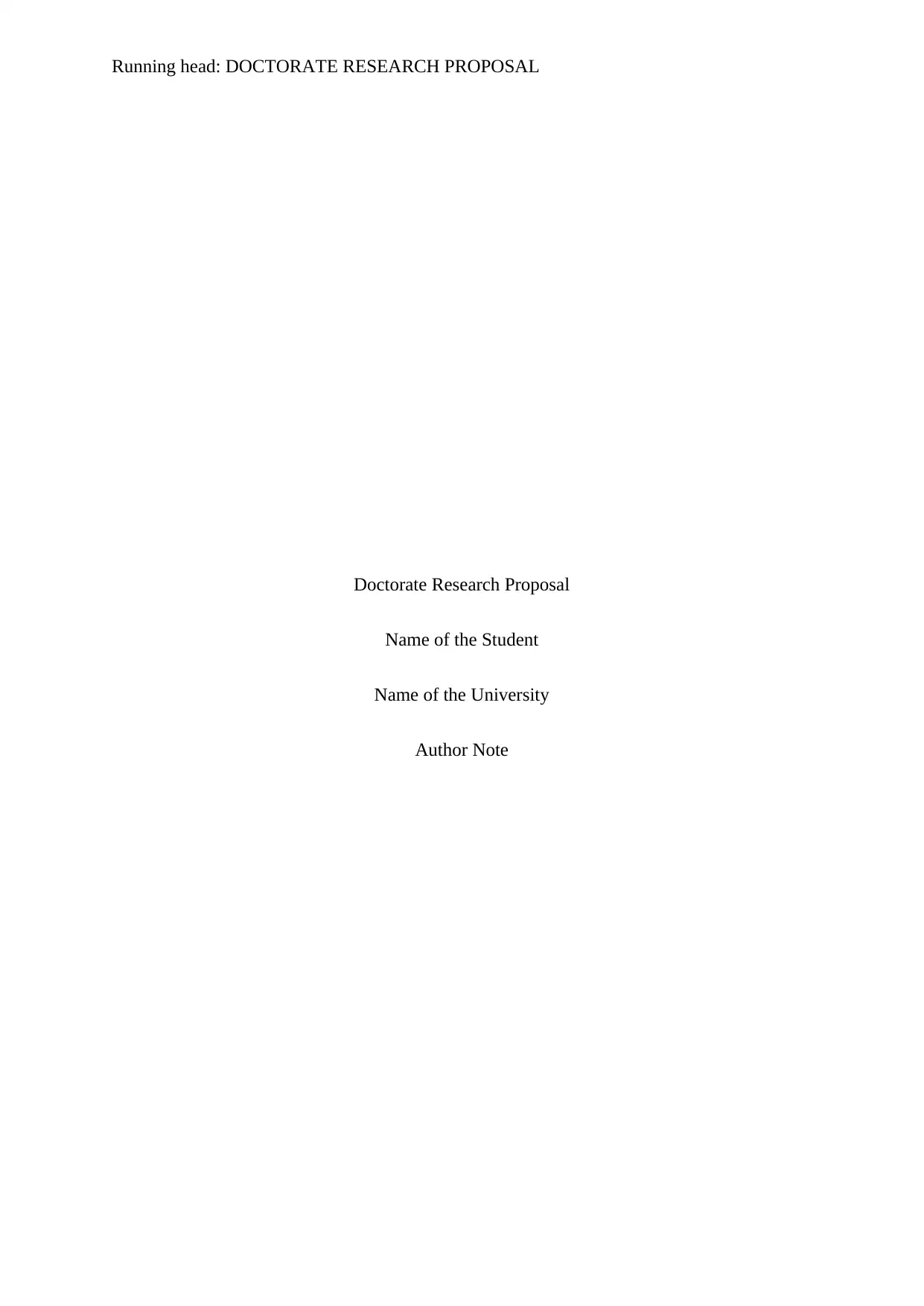
Running head: DOCTORATE RESEARCH PROPOSAL
Doctorate Research Proposal
Name of the Student
Name of the University
Author Note
Doctorate Research Proposal
Name of the Student
Name of the University
Author Note
Paraphrase This Document
Need a fresh take? Get an instant paraphrase of this document with our AI Paraphraser
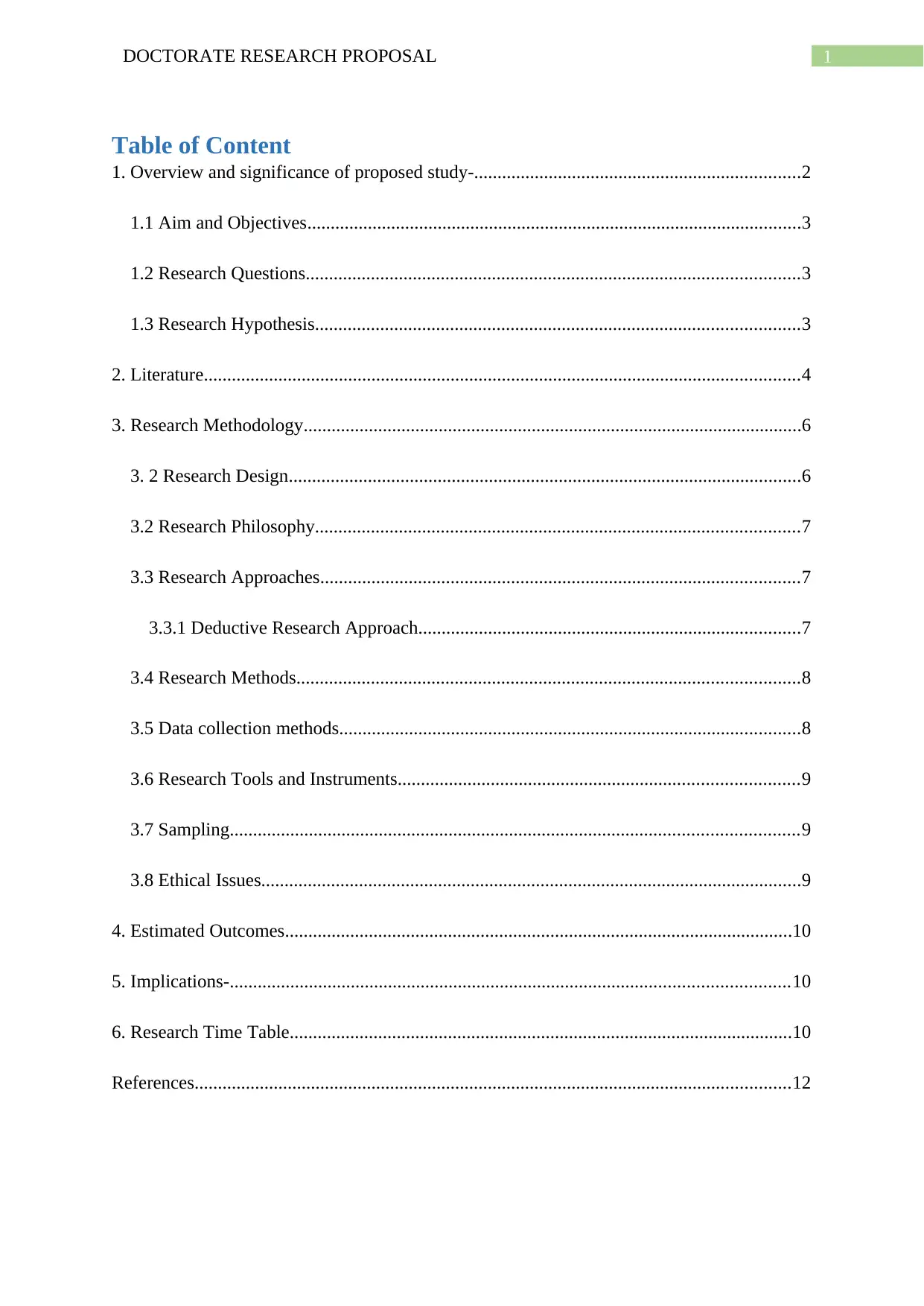
1DOCTORATE RESEARCH PROPOSAL
Table of Content
1. Overview and significance of proposed study-......................................................................2
1.1 Aim and Objectives..........................................................................................................3
1.2 Research Questions..........................................................................................................3
1.3 Research Hypothesis........................................................................................................3
2. Literature................................................................................................................................4
3. Research Methodology...........................................................................................................6
3. 2 Research Design..............................................................................................................6
3.2 Research Philosophy........................................................................................................7
3.3 Research Approaches.......................................................................................................7
3.3.1 Deductive Research Approach..................................................................................7
3.4 Research Methods............................................................................................................8
3.5 Data collection methods...................................................................................................8
3.6 Research Tools and Instruments......................................................................................9
3.7 Sampling..........................................................................................................................9
3.8 Ethical Issues....................................................................................................................9
4. Estimated Outcomes.............................................................................................................10
5. Implications-........................................................................................................................10
6. Research Time Table............................................................................................................10
References................................................................................................................................12
Table of Content
1. Overview and significance of proposed study-......................................................................2
1.1 Aim and Objectives..........................................................................................................3
1.2 Research Questions..........................................................................................................3
1.3 Research Hypothesis........................................................................................................3
2. Literature................................................................................................................................4
3. Research Methodology...........................................................................................................6
3. 2 Research Design..............................................................................................................6
3.2 Research Philosophy........................................................................................................7
3.3 Research Approaches.......................................................................................................7
3.3.1 Deductive Research Approach..................................................................................7
3.4 Research Methods............................................................................................................8
3.5 Data collection methods...................................................................................................8
3.6 Research Tools and Instruments......................................................................................9
3.7 Sampling..........................................................................................................................9
3.8 Ethical Issues....................................................................................................................9
4. Estimated Outcomes.............................................................................................................10
5. Implications-........................................................................................................................10
6. Research Time Table............................................................................................................10
References................................................................................................................................12

2DOCTORATE RESEARCH PROPOSAL
⊘ This is a preview!⊘
Do you want full access?
Subscribe today to unlock all pages.

Trusted by 1+ million students worldwide
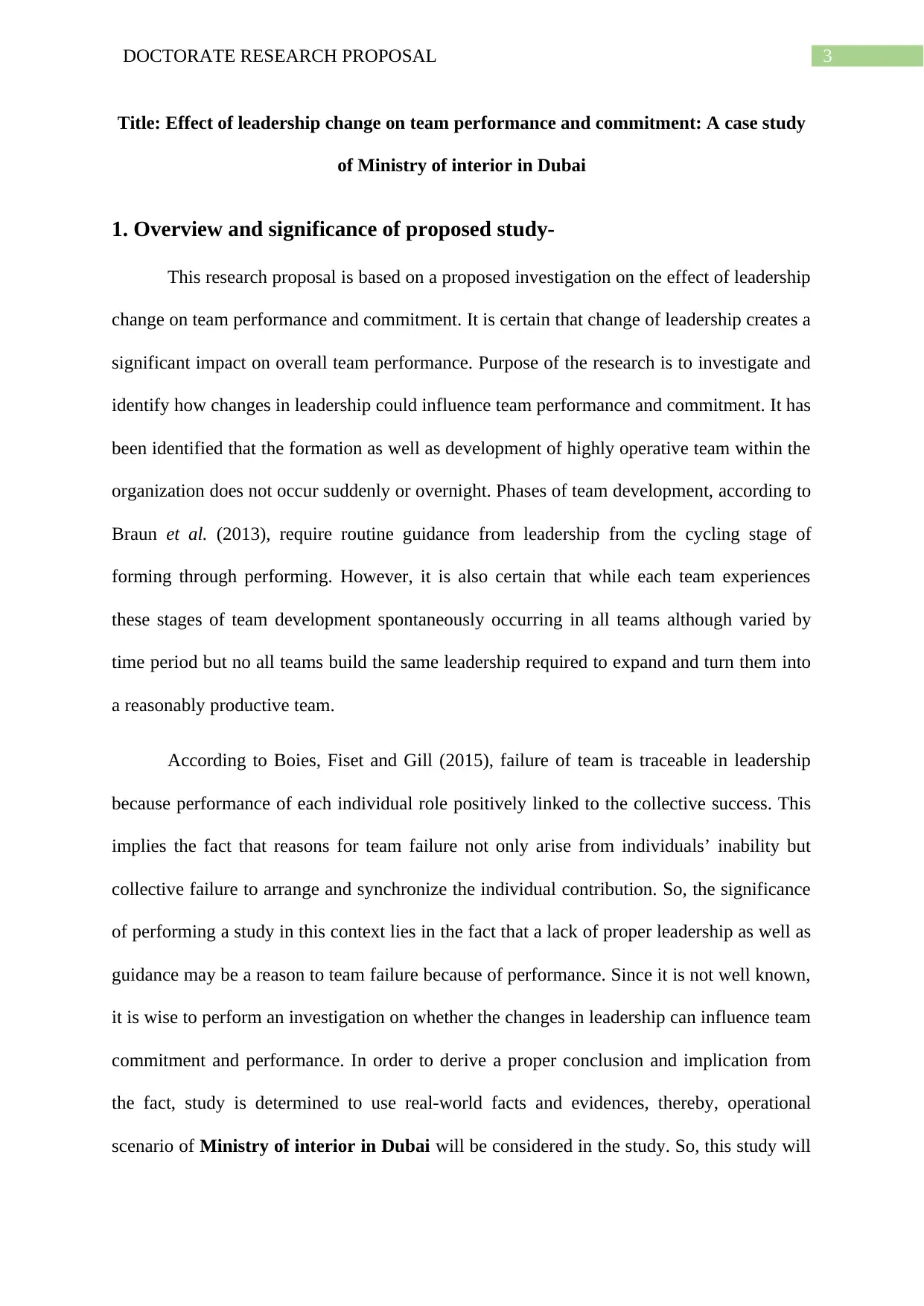
3DOCTORATE RESEARCH PROPOSAL
Title: Effect of leadership change on team performance and commitment: A case study
of Ministry of interior in Dubai
1. Overview and significance of proposed study-
This research proposal is based on a proposed investigation on the effect of leadership
change on team performance and commitment. It is certain that change of leadership creates a
significant impact on overall team performance. Purpose of the research is to investigate and
identify how changes in leadership could influence team performance and commitment. It has
been identified that the formation as well as development of highly operative team within the
organization does not occur suddenly or overnight. Phases of team development, according to
Braun et al. (2013), require routine guidance from leadership from the cycling stage of
forming through performing. However, it is also certain that while each team experiences
these stages of team development spontaneously occurring in all teams although varied by
time period but no all teams build the same leadership required to expand and turn them into
a reasonably productive team.
According to Boies, Fiset and Gill (2015), failure of team is traceable in leadership
because performance of each individual role positively linked to the collective success. This
implies the fact that reasons for team failure not only arise from individuals’ inability but
collective failure to arrange and synchronize the individual contribution. So, the significance
of performing a study in this context lies in the fact that a lack of proper leadership as well as
guidance may be a reason to team failure because of performance. Since it is not well known,
it is wise to perform an investigation on whether the changes in leadership can influence team
commitment and performance. In order to derive a proper conclusion and implication from
the fact, study is determined to use real-world facts and evidences, thereby, operational
scenario of Ministry of interior in Dubai will be considered in the study. So, this study will
Title: Effect of leadership change on team performance and commitment: A case study
of Ministry of interior in Dubai
1. Overview and significance of proposed study-
This research proposal is based on a proposed investigation on the effect of leadership
change on team performance and commitment. It is certain that change of leadership creates a
significant impact on overall team performance. Purpose of the research is to investigate and
identify how changes in leadership could influence team performance and commitment. It has
been identified that the formation as well as development of highly operative team within the
organization does not occur suddenly or overnight. Phases of team development, according to
Braun et al. (2013), require routine guidance from leadership from the cycling stage of
forming through performing. However, it is also certain that while each team experiences
these stages of team development spontaneously occurring in all teams although varied by
time period but no all teams build the same leadership required to expand and turn them into
a reasonably productive team.
According to Boies, Fiset and Gill (2015), failure of team is traceable in leadership
because performance of each individual role positively linked to the collective success. This
implies the fact that reasons for team failure not only arise from individuals’ inability but
collective failure to arrange and synchronize the individual contribution. So, the significance
of performing a study in this context lies in the fact that a lack of proper leadership as well as
guidance may be a reason to team failure because of performance. Since it is not well known,
it is wise to perform an investigation on whether the changes in leadership can influence team
commitment and performance. In order to derive a proper conclusion and implication from
the fact, study is determined to use real-world facts and evidences, thereby, operational
scenario of Ministry of interior in Dubai will be considered in the study. So, this study will
Paraphrase This Document
Need a fresh take? Get an instant paraphrase of this document with our AI Paraphraser
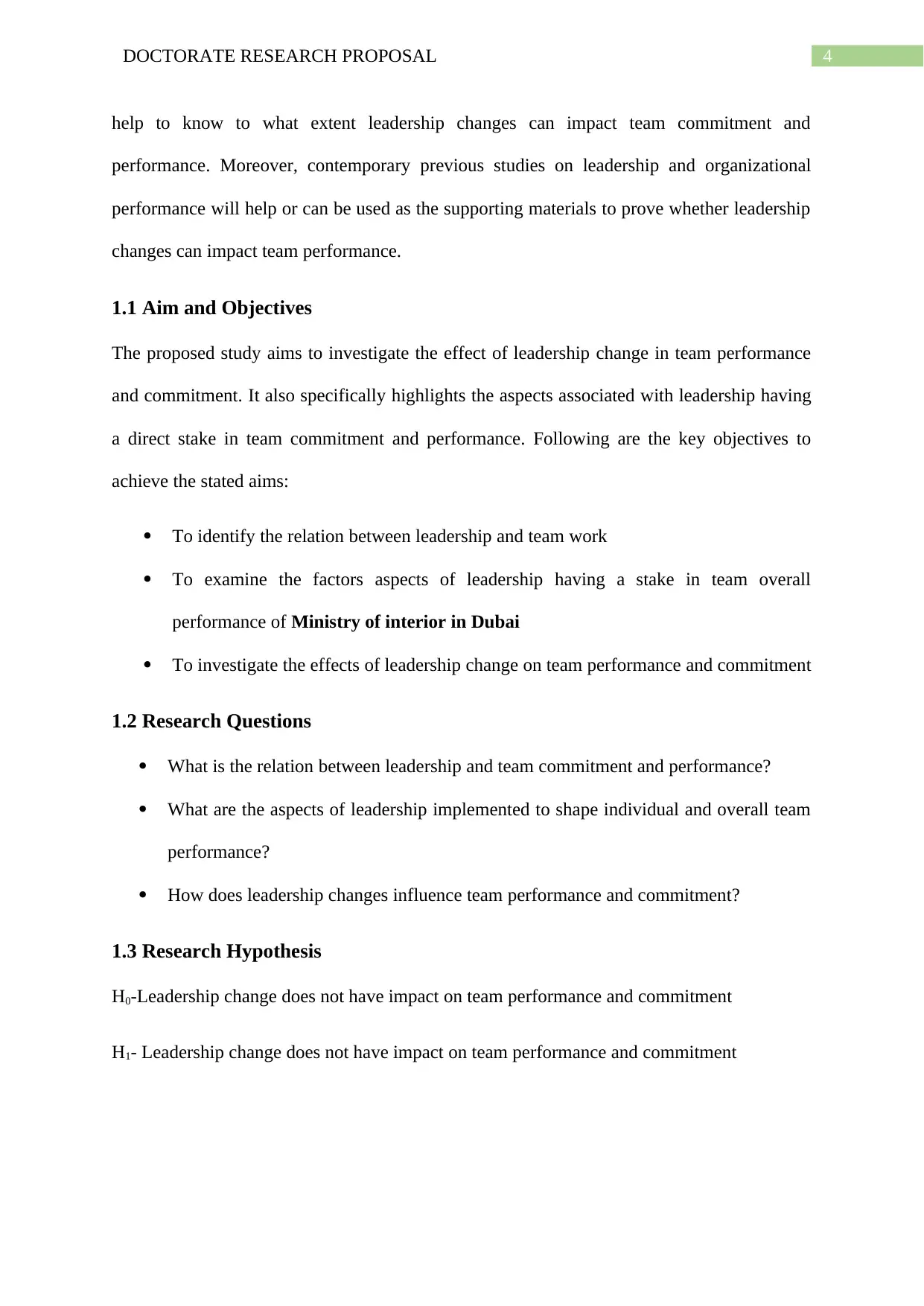
4DOCTORATE RESEARCH PROPOSAL
help to know to what extent leadership changes can impact team commitment and
performance. Moreover, contemporary previous studies on leadership and organizational
performance will help or can be used as the supporting materials to prove whether leadership
changes can impact team performance.
1.1 Aim and Objectives
The proposed study aims to investigate the effect of leadership change in team performance
and commitment. It also specifically highlights the aspects associated with leadership having
a direct stake in team commitment and performance. Following are the key objectives to
achieve the stated aims:
To identify the relation between leadership and team work
To examine the factors aspects of leadership having a stake in team overall
performance of Ministry of interior in Dubai
To investigate the effects of leadership change on team performance and commitment
1.2 Research Questions
What is the relation between leadership and team commitment and performance?
What are the aspects of leadership implemented to shape individual and overall team
performance?
How does leadership changes influence team performance and commitment?
1.3 Research Hypothesis
H0-Leadership change does not have impact on team performance and commitment
H1- Leadership change does not have impact on team performance and commitment
help to know to what extent leadership changes can impact team commitment and
performance. Moreover, contemporary previous studies on leadership and organizational
performance will help or can be used as the supporting materials to prove whether leadership
changes can impact team performance.
1.1 Aim and Objectives
The proposed study aims to investigate the effect of leadership change in team performance
and commitment. It also specifically highlights the aspects associated with leadership having
a direct stake in team commitment and performance. Following are the key objectives to
achieve the stated aims:
To identify the relation between leadership and team work
To examine the factors aspects of leadership having a stake in team overall
performance of Ministry of interior in Dubai
To investigate the effects of leadership change on team performance and commitment
1.2 Research Questions
What is the relation between leadership and team commitment and performance?
What are the aspects of leadership implemented to shape individual and overall team
performance?
How does leadership changes influence team performance and commitment?
1.3 Research Hypothesis
H0-Leadership change does not have impact on team performance and commitment
H1- Leadership change does not have impact on team performance and commitment
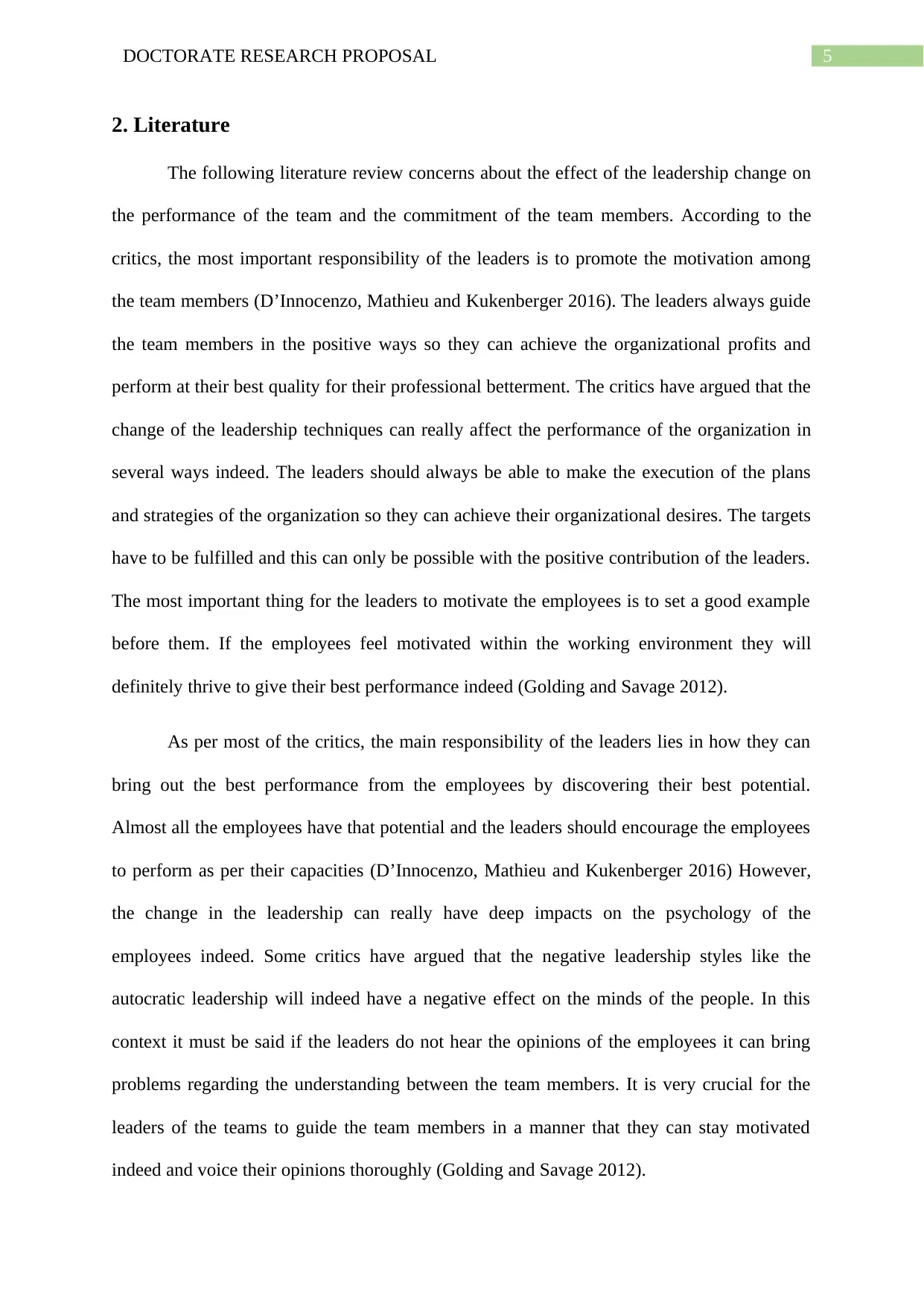
5DOCTORATE RESEARCH PROPOSAL
2. Literature
The following literature review concerns about the effect of the leadership change on
the performance of the team and the commitment of the team members. According to the
critics, the most important responsibility of the leaders is to promote the motivation among
the team members (D’Innocenzo, Mathieu and Kukenberger 2016). The leaders always guide
the team members in the positive ways so they can achieve the organizational profits and
perform at their best quality for their professional betterment. The critics have argued that the
change of the leadership techniques can really affect the performance of the organization in
several ways indeed. The leaders should always be able to make the execution of the plans
and strategies of the organization so they can achieve their organizational desires. The targets
have to be fulfilled and this can only be possible with the positive contribution of the leaders.
The most important thing for the leaders to motivate the employees is to set a good example
before them. If the employees feel motivated within the working environment they will
definitely thrive to give their best performance indeed (Golding and Savage 2012).
As per most of the critics, the main responsibility of the leaders lies in how they can
bring out the best performance from the employees by discovering their best potential.
Almost all the employees have that potential and the leaders should encourage the employees
to perform as per their capacities (D’Innocenzo, Mathieu and Kukenberger 2016) However,
the change in the leadership can really have deep impacts on the psychology of the
employees indeed. Some critics have argued that the negative leadership styles like the
autocratic leadership will indeed have a negative effect on the minds of the people. In this
context it must be said if the leaders do not hear the opinions of the employees it can bring
problems regarding the understanding between the team members. It is very crucial for the
leaders of the teams to guide the team members in a manner that they can stay motivated
indeed and voice their opinions thoroughly (Golding and Savage 2012).
2. Literature
The following literature review concerns about the effect of the leadership change on
the performance of the team and the commitment of the team members. According to the
critics, the most important responsibility of the leaders is to promote the motivation among
the team members (D’Innocenzo, Mathieu and Kukenberger 2016). The leaders always guide
the team members in the positive ways so they can achieve the organizational profits and
perform at their best quality for their professional betterment. The critics have argued that the
change of the leadership techniques can really affect the performance of the organization in
several ways indeed. The leaders should always be able to make the execution of the plans
and strategies of the organization so they can achieve their organizational desires. The targets
have to be fulfilled and this can only be possible with the positive contribution of the leaders.
The most important thing for the leaders to motivate the employees is to set a good example
before them. If the employees feel motivated within the working environment they will
definitely thrive to give their best performance indeed (Golding and Savage 2012).
As per most of the critics, the main responsibility of the leaders lies in how they can
bring out the best performance from the employees by discovering their best potential.
Almost all the employees have that potential and the leaders should encourage the employees
to perform as per their capacities (D’Innocenzo, Mathieu and Kukenberger 2016) However,
the change in the leadership can really have deep impacts on the psychology of the
employees indeed. Some critics have argued that the negative leadership styles like the
autocratic leadership will indeed have a negative effect on the minds of the people. In this
context it must be said if the leaders do not hear the opinions of the employees it can bring
problems regarding the understanding between the team members. It is very crucial for the
leaders of the teams to guide the team members in a manner that they can stay motivated
indeed and voice their opinions thoroughly (Golding and Savage 2012).
⊘ This is a preview!⊘
Do you want full access?
Subscribe today to unlock all pages.

Trusted by 1+ million students worldwide
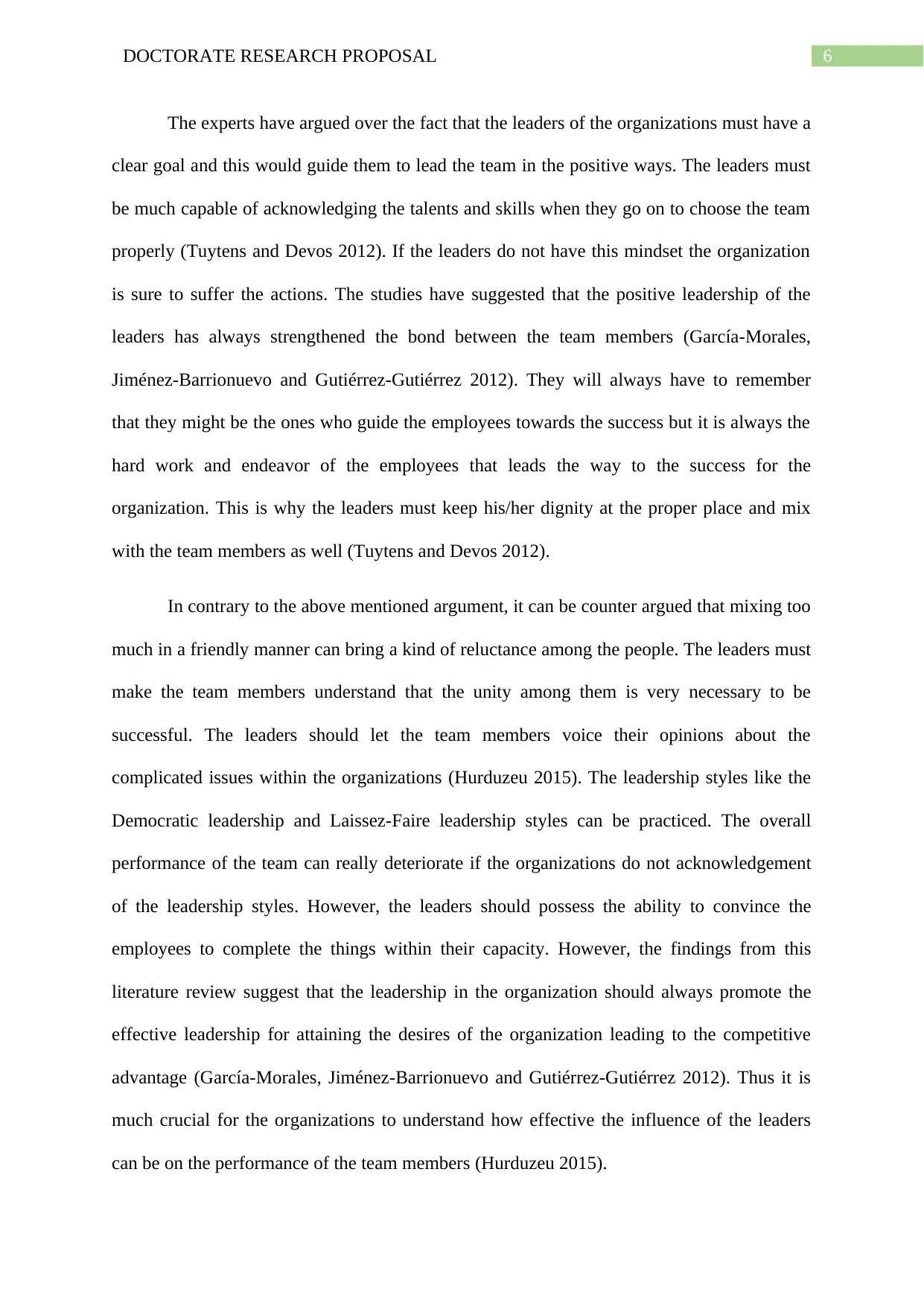
6DOCTORATE RESEARCH PROPOSAL
The experts have argued over the fact that the leaders of the organizations must have a
clear goal and this would guide them to lead the team in the positive ways. The leaders must
be much capable of acknowledging the talents and skills when they go on to choose the team
properly (Tuytens and Devos 2012). If the leaders do not have this mindset the organization
is sure to suffer the actions. The studies have suggested that the positive leadership of the
leaders has always strengthened the bond between the team members (García-Morales,
Jiménez-Barrionuevo and Gutiérrez-Gutiérrez 2012). They will always have to remember
that they might be the ones who guide the employees towards the success but it is always the
hard work and endeavor of the employees that leads the way to the success for the
organization. This is why the leaders must keep his/her dignity at the proper place and mix
with the team members as well (Tuytens and Devos 2012).
In contrary to the above mentioned argument, it can be counter argued that mixing too
much in a friendly manner can bring a kind of reluctance among the people. The leaders must
make the team members understand that the unity among them is very necessary to be
successful. The leaders should let the team members voice their opinions about the
complicated issues within the organizations (Hurduzeu 2015). The leadership styles like the
Democratic leadership and Laissez-Faire leadership styles can be practiced. The overall
performance of the team can really deteriorate if the organizations do not acknowledgement
of the leadership styles. However, the leaders should possess the ability to convince the
employees to complete the things within their capacity. However, the findings from this
literature review suggest that the leadership in the organization should always promote the
effective leadership for attaining the desires of the organization leading to the competitive
advantage (García-Morales, Jiménez-Barrionuevo and Gutiérrez-Gutiérrez 2012). Thus it is
much crucial for the organizations to understand how effective the influence of the leaders
can be on the performance of the team members (Hurduzeu 2015).
The experts have argued over the fact that the leaders of the organizations must have a
clear goal and this would guide them to lead the team in the positive ways. The leaders must
be much capable of acknowledging the talents and skills when they go on to choose the team
properly (Tuytens and Devos 2012). If the leaders do not have this mindset the organization
is sure to suffer the actions. The studies have suggested that the positive leadership of the
leaders has always strengthened the bond between the team members (García-Morales,
Jiménez-Barrionuevo and Gutiérrez-Gutiérrez 2012). They will always have to remember
that they might be the ones who guide the employees towards the success but it is always the
hard work and endeavor of the employees that leads the way to the success for the
organization. This is why the leaders must keep his/her dignity at the proper place and mix
with the team members as well (Tuytens and Devos 2012).
In contrary to the above mentioned argument, it can be counter argued that mixing too
much in a friendly manner can bring a kind of reluctance among the people. The leaders must
make the team members understand that the unity among them is very necessary to be
successful. The leaders should let the team members voice their opinions about the
complicated issues within the organizations (Hurduzeu 2015). The leadership styles like the
Democratic leadership and Laissez-Faire leadership styles can be practiced. The overall
performance of the team can really deteriorate if the organizations do not acknowledgement
of the leadership styles. However, the leaders should possess the ability to convince the
employees to complete the things within their capacity. However, the findings from this
literature review suggest that the leadership in the organization should always promote the
effective leadership for attaining the desires of the organization leading to the competitive
advantage (García-Morales, Jiménez-Barrionuevo and Gutiérrez-Gutiérrez 2012). Thus it is
much crucial for the organizations to understand how effective the influence of the leaders
can be on the performance of the team members (Hurduzeu 2015).
Paraphrase This Document
Need a fresh take? Get an instant paraphrase of this document with our AI Paraphraser
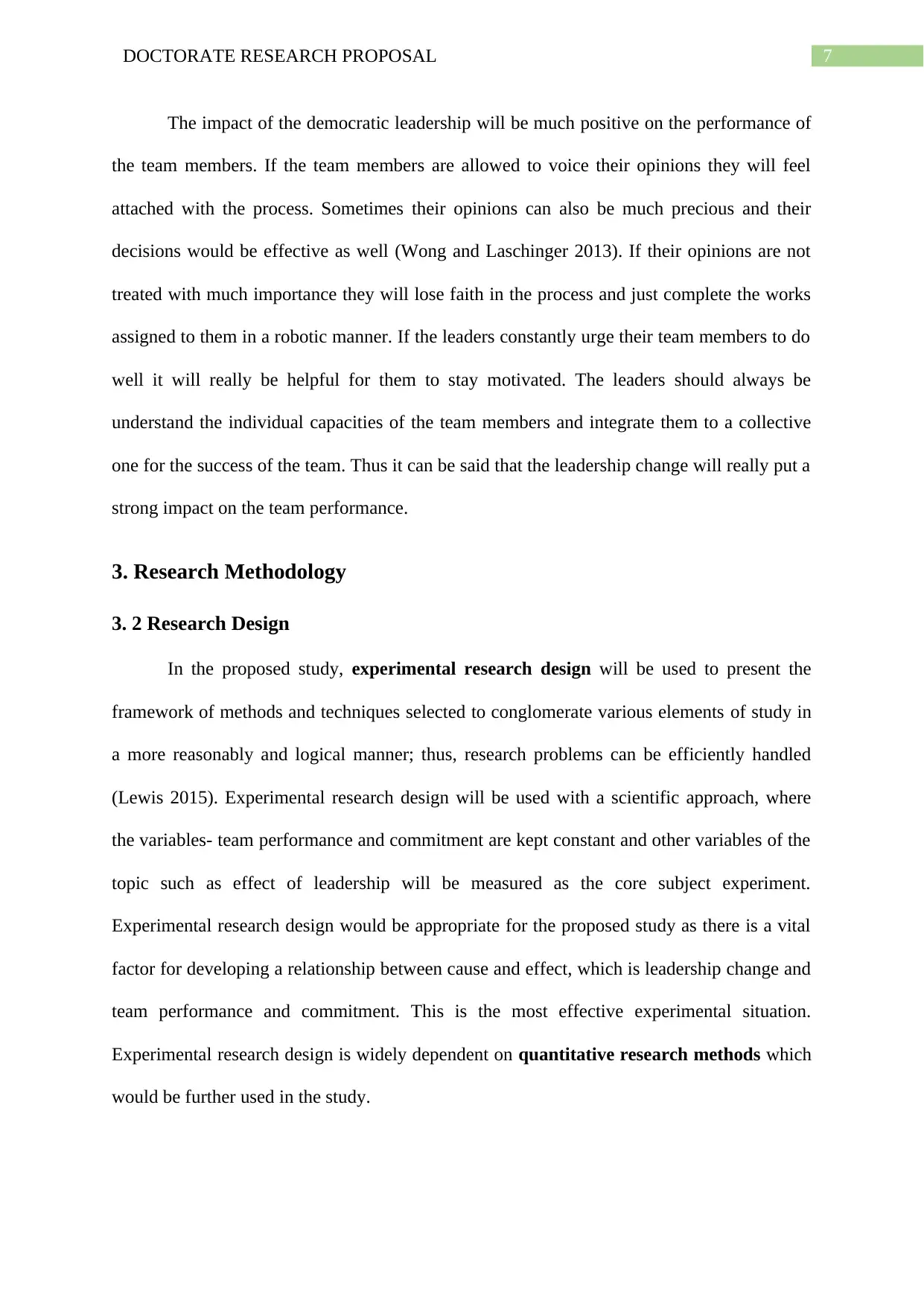
7DOCTORATE RESEARCH PROPOSAL
The impact of the democratic leadership will be much positive on the performance of
the team members. If the team members are allowed to voice their opinions they will feel
attached with the process. Sometimes their opinions can also be much precious and their
decisions would be effective as well (Wong and Laschinger 2013). If their opinions are not
treated with much importance they will lose faith in the process and just complete the works
assigned to them in a robotic manner. If the leaders constantly urge their team members to do
well it will really be helpful for them to stay motivated. The leaders should always be
understand the individual capacities of the team members and integrate them to a collective
one for the success of the team. Thus it can be said that the leadership change will really put a
strong impact on the team performance.
3. Research Methodology
3. 2 Research Design
In the proposed study, experimental research design will be used to present the
framework of methods and techniques selected to conglomerate various elements of study in
a more reasonably and logical manner; thus, research problems can be efficiently handled
(Lewis 2015). Experimental research design will be used with a scientific approach, where
the variables- team performance and commitment are kept constant and other variables of the
topic such as effect of leadership will be measured as the core subject experiment.
Experimental research design would be appropriate for the proposed study as there is a vital
factor for developing a relationship between cause and effect, which is leadership change and
team performance and commitment. This is the most effective experimental situation.
Experimental research design is widely dependent on quantitative research methods which
would be further used in the study.
The impact of the democratic leadership will be much positive on the performance of
the team members. If the team members are allowed to voice their opinions they will feel
attached with the process. Sometimes their opinions can also be much precious and their
decisions would be effective as well (Wong and Laschinger 2013). If their opinions are not
treated with much importance they will lose faith in the process and just complete the works
assigned to them in a robotic manner. If the leaders constantly urge their team members to do
well it will really be helpful for them to stay motivated. The leaders should always be
understand the individual capacities of the team members and integrate them to a collective
one for the success of the team. Thus it can be said that the leadership change will really put a
strong impact on the team performance.
3. Research Methodology
3. 2 Research Design
In the proposed study, experimental research design will be used to present the
framework of methods and techniques selected to conglomerate various elements of study in
a more reasonably and logical manner; thus, research problems can be efficiently handled
(Lewis 2015). Experimental research design will be used with a scientific approach, where
the variables- team performance and commitment are kept constant and other variables of the
topic such as effect of leadership will be measured as the core subject experiment.
Experimental research design would be appropriate for the proposed study as there is a vital
factor for developing a relationship between cause and effect, which is leadership change and
team performance and commitment. This is the most effective experimental situation.
Experimental research design is widely dependent on quantitative research methods which
would be further used in the study.
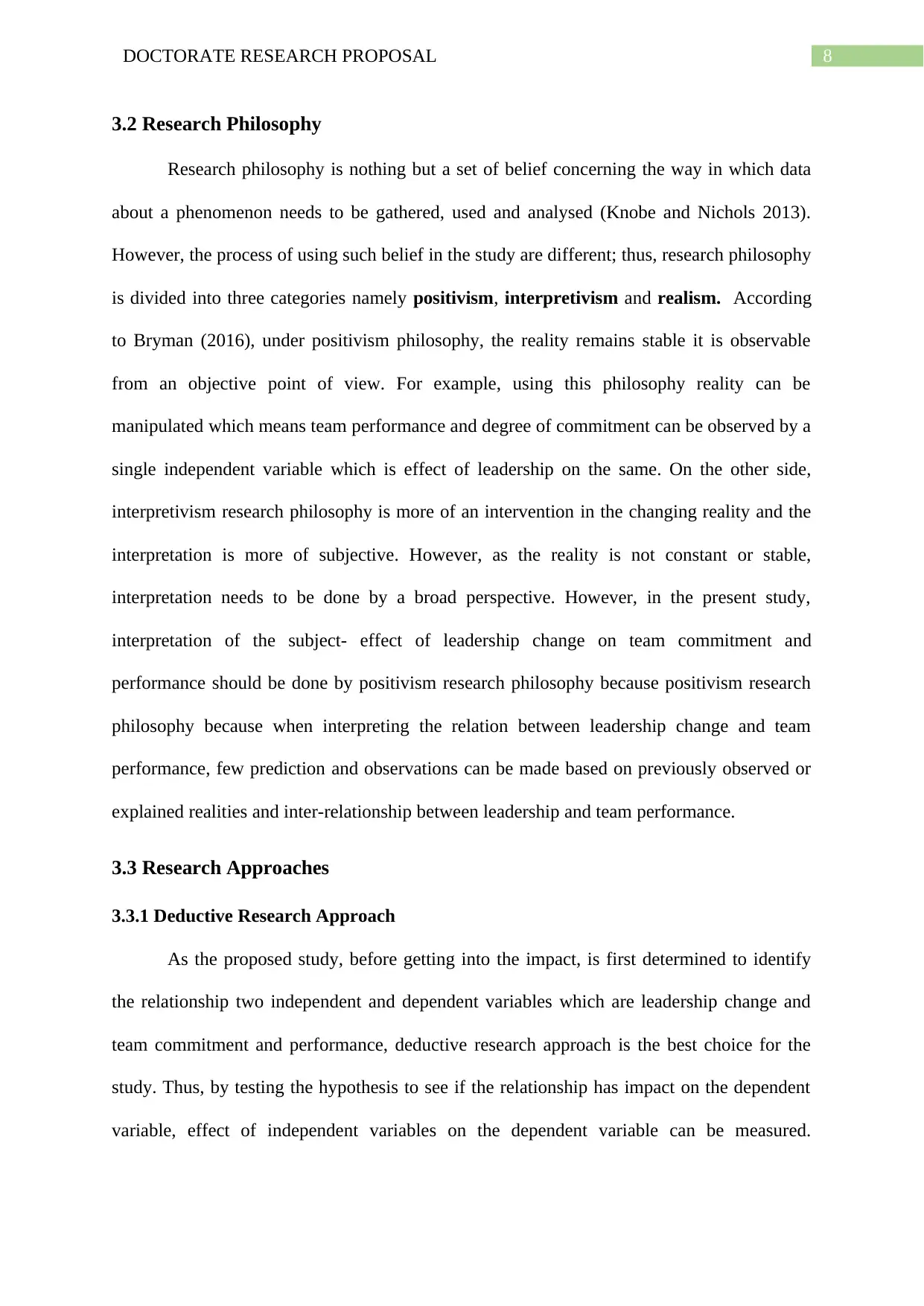
8DOCTORATE RESEARCH PROPOSAL
3.2 Research Philosophy
Research philosophy is nothing but a set of belief concerning the way in which data
about a phenomenon needs to be gathered, used and analysed (Knobe and Nichols 2013).
However, the process of using such belief in the study are different; thus, research philosophy
is divided into three categories namely positivism, interpretivism and realism. According
to Bryman (2016), under positivism philosophy, the reality remains stable it is observable
from an objective point of view. For example, using this philosophy reality can be
manipulated which means team performance and degree of commitment can be observed by a
single independent variable which is effect of leadership on the same. On the other side,
interpretivism research philosophy is more of an intervention in the changing reality and the
interpretation is more of subjective. However, as the reality is not constant or stable,
interpretation needs to be done by a broad perspective. However, in the present study,
interpretation of the subject- effect of leadership change on team commitment and
performance should be done by positivism research philosophy because positivism research
philosophy because when interpreting the relation between leadership change and team
performance, few prediction and observations can be made based on previously observed or
explained realities and inter-relationship between leadership and team performance.
3.3 Research Approaches
3.3.1 Deductive Research Approach
As the proposed study, before getting into the impact, is first determined to identify
the relationship two independent and dependent variables which are leadership change and
team commitment and performance, deductive research approach is the best choice for the
study. Thus, by testing the hypothesis to see if the relationship has impact on the dependent
variable, effect of independent variables on the dependent variable can be measured.
3.2 Research Philosophy
Research philosophy is nothing but a set of belief concerning the way in which data
about a phenomenon needs to be gathered, used and analysed (Knobe and Nichols 2013).
However, the process of using such belief in the study are different; thus, research philosophy
is divided into three categories namely positivism, interpretivism and realism. According
to Bryman (2016), under positivism philosophy, the reality remains stable it is observable
from an objective point of view. For example, using this philosophy reality can be
manipulated which means team performance and degree of commitment can be observed by a
single independent variable which is effect of leadership on the same. On the other side,
interpretivism research philosophy is more of an intervention in the changing reality and the
interpretation is more of subjective. However, as the reality is not constant or stable,
interpretation needs to be done by a broad perspective. However, in the present study,
interpretation of the subject- effect of leadership change on team commitment and
performance should be done by positivism research philosophy because positivism research
philosophy because when interpreting the relation between leadership change and team
performance, few prediction and observations can be made based on previously observed or
explained realities and inter-relationship between leadership and team performance.
3.3 Research Approaches
3.3.1 Deductive Research Approach
As the proposed study, before getting into the impact, is first determined to identify
the relationship two independent and dependent variables which are leadership change and
team commitment and performance, deductive research approach is the best choice for the
study. Thus, by testing the hypothesis to see if the relationship has impact on the dependent
variable, effect of independent variables on the dependent variable can be measured.
⊘ This is a preview!⊘
Do you want full access?
Subscribe today to unlock all pages.

Trusted by 1+ million students worldwide
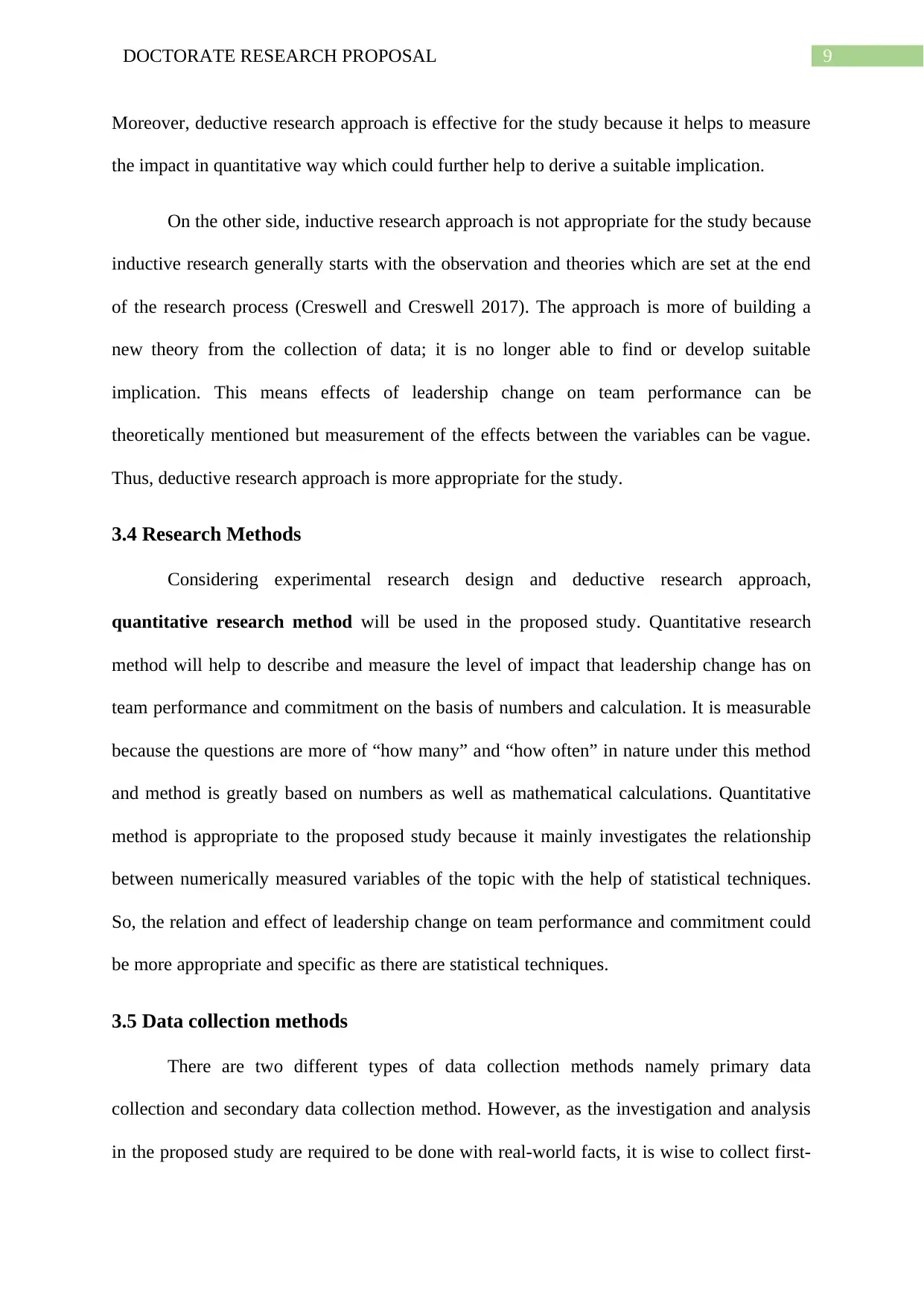
9DOCTORATE RESEARCH PROPOSAL
Moreover, deductive research approach is effective for the study because it helps to measure
the impact in quantitative way which could further help to derive a suitable implication.
On the other side, inductive research approach is not appropriate for the study because
inductive research generally starts with the observation and theories which are set at the end
of the research process (Creswell and Creswell 2017). The approach is more of building a
new theory from the collection of data; it is no longer able to find or develop suitable
implication. This means effects of leadership change on team performance can be
theoretically mentioned but measurement of the effects between the variables can be vague.
Thus, deductive research approach is more appropriate for the study.
3.4 Research Methods
Considering experimental research design and deductive research approach,
quantitative research method will be used in the proposed study. Quantitative research
method will help to describe and measure the level of impact that leadership change has on
team performance and commitment on the basis of numbers and calculation. It is measurable
because the questions are more of “how many” and “how often” in nature under this method
and method is greatly based on numbers as well as mathematical calculations. Quantitative
method is appropriate to the proposed study because it mainly investigates the relationship
between numerically measured variables of the topic with the help of statistical techniques.
So, the relation and effect of leadership change on team performance and commitment could
be more appropriate and specific as there are statistical techniques.
3.5 Data collection methods
There are two different types of data collection methods namely primary data
collection and secondary data collection method. However, as the investigation and analysis
in the proposed study are required to be done with real-world facts, it is wise to collect first-
Moreover, deductive research approach is effective for the study because it helps to measure
the impact in quantitative way which could further help to derive a suitable implication.
On the other side, inductive research approach is not appropriate for the study because
inductive research generally starts with the observation and theories which are set at the end
of the research process (Creswell and Creswell 2017). The approach is more of building a
new theory from the collection of data; it is no longer able to find or develop suitable
implication. This means effects of leadership change on team performance can be
theoretically mentioned but measurement of the effects between the variables can be vague.
Thus, deductive research approach is more appropriate for the study.
3.4 Research Methods
Considering experimental research design and deductive research approach,
quantitative research method will be used in the proposed study. Quantitative research
method will help to describe and measure the level of impact that leadership change has on
team performance and commitment on the basis of numbers and calculation. It is measurable
because the questions are more of “how many” and “how often” in nature under this method
and method is greatly based on numbers as well as mathematical calculations. Quantitative
method is appropriate to the proposed study because it mainly investigates the relationship
between numerically measured variables of the topic with the help of statistical techniques.
So, the relation and effect of leadership change on team performance and commitment could
be more appropriate and specific as there are statistical techniques.
3.5 Data collection methods
There are two different types of data collection methods namely primary data
collection and secondary data collection method. However, as the investigation and analysis
in the proposed study are required to be done with real-world facts, it is wise to collect first-
Paraphrase This Document
Need a fresh take? Get an instant paraphrase of this document with our AI Paraphraser
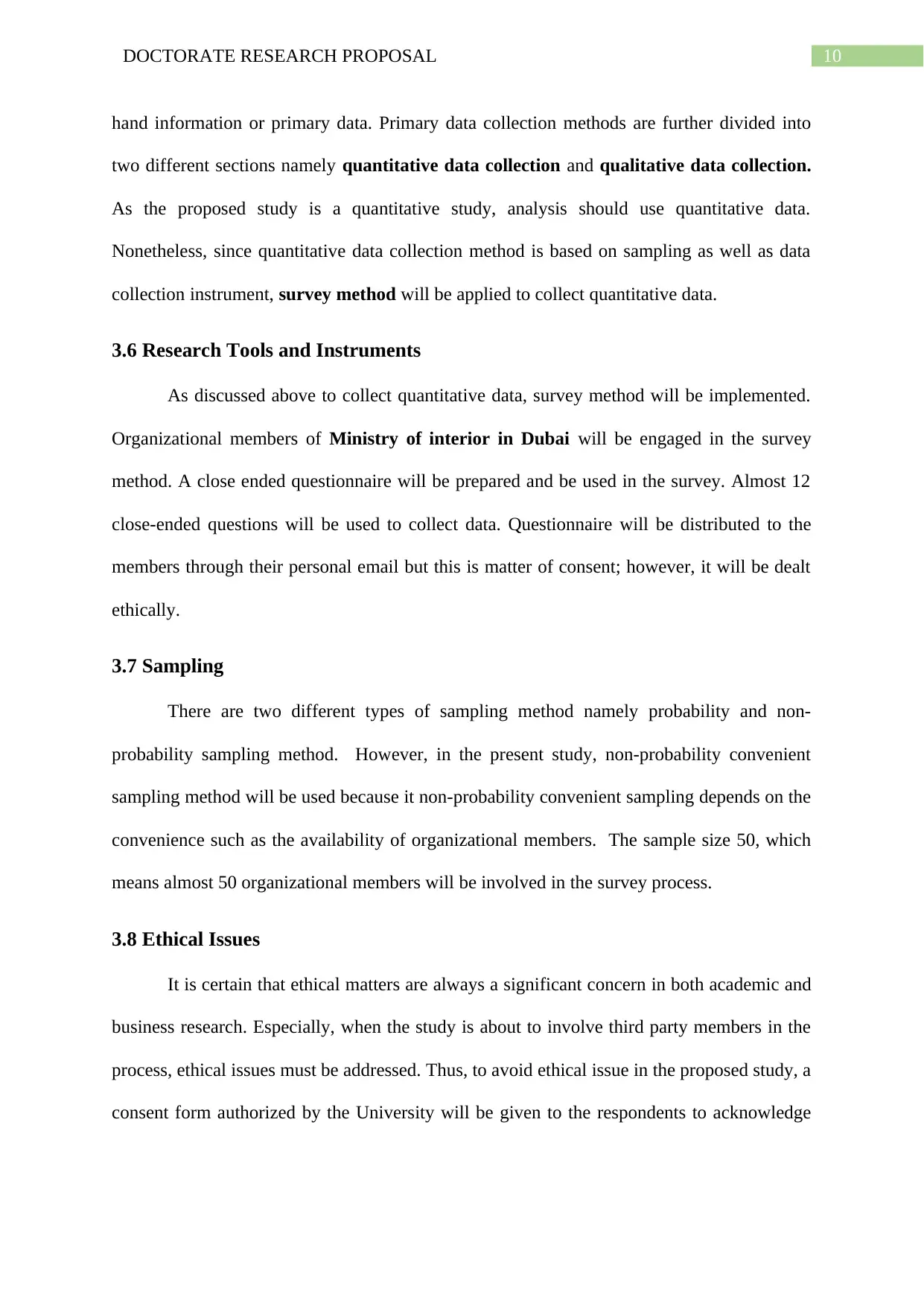
10DOCTORATE RESEARCH PROPOSAL
hand information or primary data. Primary data collection methods are further divided into
two different sections namely quantitative data collection and qualitative data collection.
As the proposed study is a quantitative study, analysis should use quantitative data.
Nonetheless, since quantitative data collection method is based on sampling as well as data
collection instrument, survey method will be applied to collect quantitative data.
3.6 Research Tools and Instruments
As discussed above to collect quantitative data, survey method will be implemented.
Organizational members of Ministry of interior in Dubai will be engaged in the survey
method. A close ended questionnaire will be prepared and be used in the survey. Almost 12
close-ended questions will be used to collect data. Questionnaire will be distributed to the
members through their personal email but this is matter of consent; however, it will be dealt
ethically.
3.7 Sampling
There are two different types of sampling method namely probability and non-
probability sampling method. However, in the present study, non-probability convenient
sampling method will be used because it non-probability convenient sampling depends on the
convenience such as the availability of organizational members. The sample size 50, which
means almost 50 organizational members will be involved in the survey process.
3.8 Ethical Issues
It is certain that ethical matters are always a significant concern in both academic and
business research. Especially, when the study is about to involve third party members in the
process, ethical issues must be addressed. Thus, to avoid ethical issue in the proposed study, a
consent form authorized by the University will be given to the respondents to acknowledge
hand information or primary data. Primary data collection methods are further divided into
two different sections namely quantitative data collection and qualitative data collection.
As the proposed study is a quantitative study, analysis should use quantitative data.
Nonetheless, since quantitative data collection method is based on sampling as well as data
collection instrument, survey method will be applied to collect quantitative data.
3.6 Research Tools and Instruments
As discussed above to collect quantitative data, survey method will be implemented.
Organizational members of Ministry of interior in Dubai will be engaged in the survey
method. A close ended questionnaire will be prepared and be used in the survey. Almost 12
close-ended questions will be used to collect data. Questionnaire will be distributed to the
members through their personal email but this is matter of consent; however, it will be dealt
ethically.
3.7 Sampling
There are two different types of sampling method namely probability and non-
probability sampling method. However, in the present study, non-probability convenient
sampling method will be used because it non-probability convenient sampling depends on the
convenience such as the availability of organizational members. The sample size 50, which
means almost 50 organizational members will be involved in the survey process.
3.8 Ethical Issues
It is certain that ethical matters are always a significant concern in both academic and
business research. Especially, when the study is about to involve third party members in the
process, ethical issues must be addressed. Thus, to avoid ethical issue in the proposed study, a
consent form authorized by the University will be given to the respondents to acknowledge
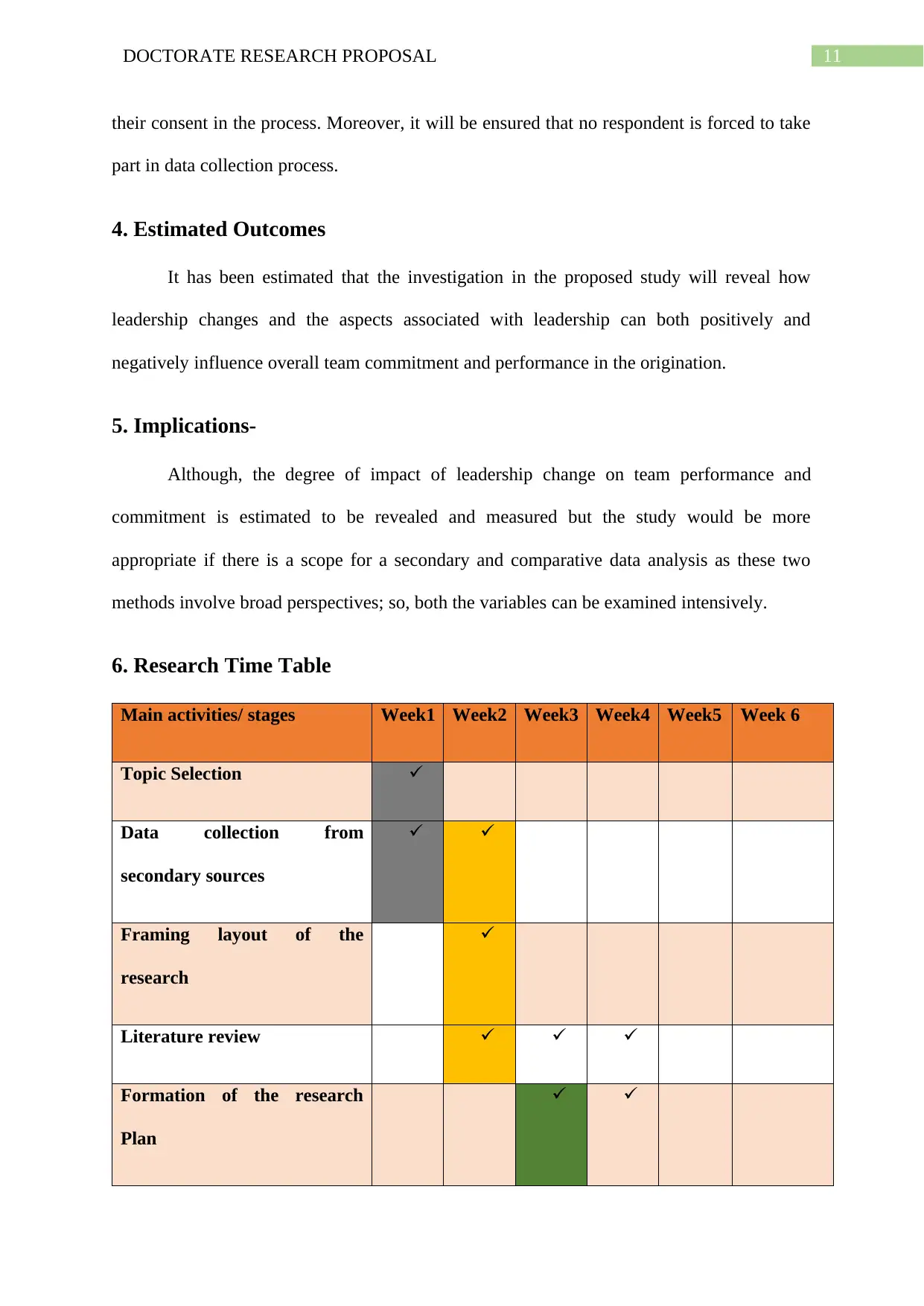
11DOCTORATE RESEARCH PROPOSAL
their consent in the process. Moreover, it will be ensured that no respondent is forced to take
part in data collection process.
4. Estimated Outcomes
It has been estimated that the investigation in the proposed study will reveal how
leadership changes and the aspects associated with leadership can both positively and
negatively influence overall team commitment and performance in the origination.
5. Implications-
Although, the degree of impact of leadership change on team performance and
commitment is estimated to be revealed and measured but the study would be more
appropriate if there is a scope for a secondary and comparative data analysis as these two
methods involve broad perspectives; so, both the variables can be examined intensively.
6. Research Time Table
Main activities/ stages Week1 Week2 Week3 Week4 Week5 Week 6
Topic Selection
Data collection from
secondary sources
Framing layout of the
research
Literature review
Formation of the research
Plan
their consent in the process. Moreover, it will be ensured that no respondent is forced to take
part in data collection process.
4. Estimated Outcomes
It has been estimated that the investigation in the proposed study will reveal how
leadership changes and the aspects associated with leadership can both positively and
negatively influence overall team commitment and performance in the origination.
5. Implications-
Although, the degree of impact of leadership change on team performance and
commitment is estimated to be revealed and measured but the study would be more
appropriate if there is a scope for a secondary and comparative data analysis as these two
methods involve broad perspectives; so, both the variables can be examined intensively.
6. Research Time Table
Main activities/ stages Week1 Week2 Week3 Week4 Week5 Week 6
Topic Selection
Data collection from
secondary sources
Framing layout of the
research
Literature review
Formation of the research
Plan
⊘ This is a preview!⊘
Do you want full access?
Subscribe today to unlock all pages.

Trusted by 1+ million students worldwide
1 out of 15
Related Documents
Your All-in-One AI-Powered Toolkit for Academic Success.
+13062052269
info@desklib.com
Available 24*7 on WhatsApp / Email
![[object Object]](/_next/static/media/star-bottom.7253800d.svg)
Unlock your academic potential
Copyright © 2020–2025 A2Z Services. All Rights Reserved. Developed and managed by ZUCOL.





